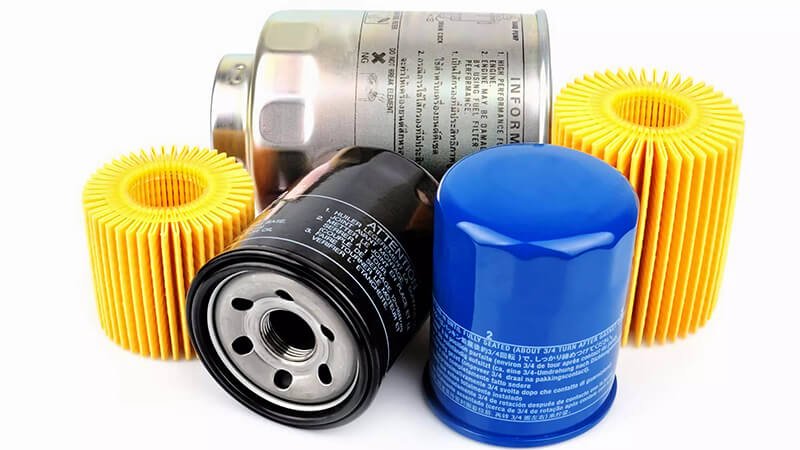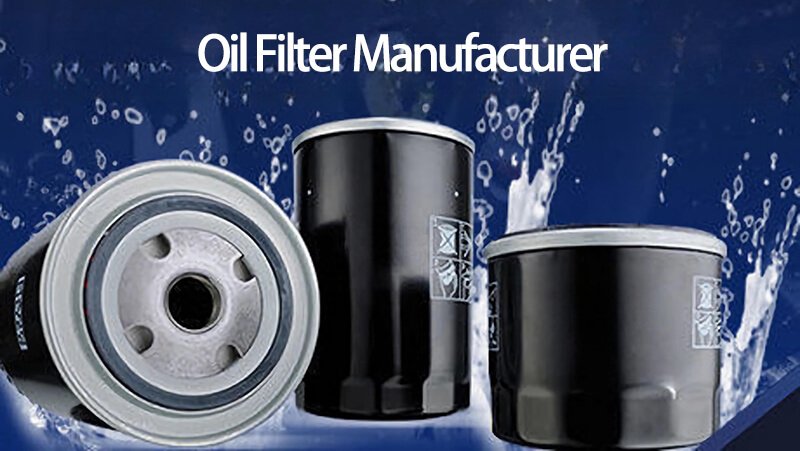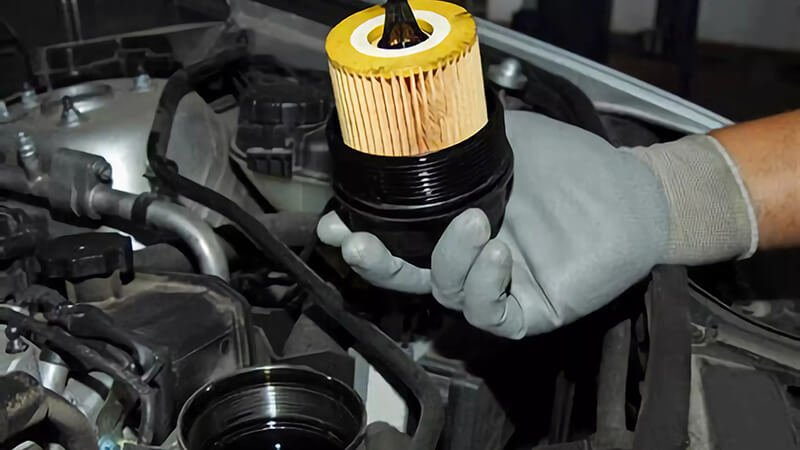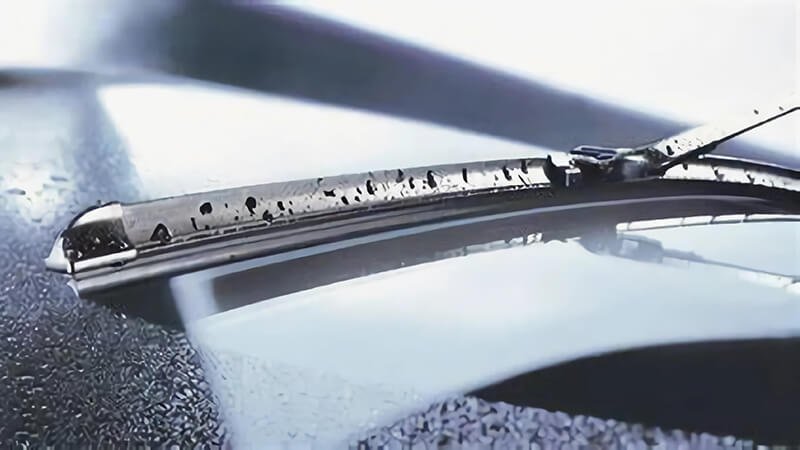If you're a car owner, you’ve probably heard about oil filters, but do you truly understand their importance? These small components have a huge impact on the performance and longevity of your engine. Let’s explore why automotive oil filters are so essential for your vehicle.
Automotive oil filters play a crucial role in keeping your engine running smoothly. By filtering out contaminants from the engine oil, they prevent damage to vital engine parts, enhancing your car's overall performance and lifespan.
Now that we know oil filters are important, let's take a closer look at how they work and why they’re necessary to protect your engine.

How does an automotive oil filter work?
You might be surprised by how something as simple as an oil filter can have such a big impact on your engine. The mechanics behind it are more complex than you might think, and understanding how it works can help you appreciate its role in your car.
An automotive oil filter1 works by trapping contaminants that are present in the engine oil. As the oil circulates through the engine, it passes through the filter, where particles like dirt, metal shavings, and carbon are removed to ensure smooth engine operation.
The way an oil filtration system2 works is quite fascinating and essential for maintaining the health of your engine. Let’s break down the process of how an oil filter ensures your engine oil remains clean and effective.
Filtration Process
The primary function of an oil filter is to remove contaminants that can cause engine wear. When oil circulates through the engine, it picks up dirt, metal particles, carbon, and other debris. These contaminants can significantly damage engine components like pistons3, cylinders4, and bearings5 if left untreated. The oil filter works by trapping these particles and preventing them from re-entering the engine.
The filtration process can be broken down into three key stages:
- Coarse Filtration: This is the first line of defense. The oil passes through a mesh screen that filters out larger particles like dirt and dust.
- Fine Filtration: After coarse filtration, the oil enters a finer filtration media, often made from paper, synthetic fibers, or cotton, that captures smaller particles like carbon and metal shavings.
- Polishing: Some high-performance filters include additional layers to further purify the oil, ensuring only the cleanest oil reaches the engine components.
| Filtration Stage | Purpose | Typical Particle Size Filtered |
|---|---|---|
| Coarse Filtration | Removes larger contaminants like dirt, debris | 10–50 microns |
| Fine Filtration | Captures smaller particles like carbon, metal | 2–10 microns |
| Polishing | Further purifies oil for high-performance | 1–5 microns |
Bypass Valve
In cases where the oil filter becomes clogged or if the oil is too thick, a bypass valve allows the oil to flow directly into the engine. While this prevents complete blockage of oil flow, it bypasses the filter's cleansing action. This is a protective measure to avoid engine damage but does reduce filtration efficiency.
Filter Materials
The material used in the filter plays a major role in its ability to trap contaminants. Most modern filters use a combination of paper, cotton, and synthetic fibers. Paper filters are great at capturing small particles, while synthetic materials offer durability and a longer lifespan. For high-performance engines, synthetic filters with additional pleating are commonly used to provide better filtration efficiency and a longer life.
By understanding how oil filters work, we can see why they are an essential part of maintaining engine health and performance.

Why are oil filters necessary in automobile engines?
Oil filters are one of those automotive components you might overlook, but they’re absolutely crucial for your engine’s performance. Without a proper oil filter, your engine is at risk of premature wear and failure. Let’s explore why oil filters6 are necessary.
Oil filters are necessary because they keep engine oil free from contaminants that could damage critical components. Without them, harmful particles would circulate, leading to reduced performance and faster engine deterioration.
Oil filters might seem like a small part of your car, but they have a big responsibility. Let’s take a deeper look at why oil filters are an essential part of your engine’s health and performance.
Protecting Engine Components
Engine oil is the lifeblood of your car's engine. It lubricates moving parts, reduces friction, and prevents wear. However, over time, the oil becomes contaminated with particles from engine wear, dirt from the environment, and other byproducts of combustion. If these contaminants are not removed, they can scratch, corrode, or damage engine components like pistons7, cylinders8, and bearings9.
For example, small metal shavings from the engine’s internal moving parts can mix with the oil. If left unchecked, these shavings will circulate through the engine, causing abrasive wear on critical parts. Oil filters prevent this by capturing the metal debris, ensuring only clean oil flows through the engine.
Maintaining Oil Efficiency
The condition of the oil is just as important as the filtration process. Contaminated oil is thicker and less effective at lubricating engine parts. Oil filters help maintain the efficiency of engine oil by preventing contaminants from building up. Clean oil is thinner and flows more easily, which results in better lubrication and less engine strain. In addition, the more efficient the oil filter10 is, the longer the oil can be used before needing to be changed.
| Benefit | Explanation |
|---|---|
| Engine Protection | Removes harmful contaminants that cause engine wear |
| Improved Lubrication | Maintains smooth oil flow for better engine efficiency |
| Oil Life Extension | Helps extend the oil change interval by keeping oil clean |
Preventing Oil Sludge Build-Up
Oil sludge is the result of a buildup of contaminants that haven’t been filtered out by a worn or clogged oil filter. This sludge can clog vital oil passages, reducing the oil’s ability to lubricate the engine. Over time, it can even result in engine overheating or failure. By keeping oil clean, oil filters prevent sludge formation, ensuring the engine continues to run efficiently.
Reducing Carbon Buildup
Modern engines produce carbon as a byproduct of combustion. Over time, this carbon builds up in the engine oil, which can lead to excessive wear. Oil filters remove carbon particles from the oil before they have a chance to damage the engine. This keeps the engine running smoothly and reduces the need for costly repairs.

Is an oil filter used to protect the engine's oil from contaminants?
One of the main functions of an oil filter11 is to protect the engine oil from harmful contaminants. But is it the only function? Let's dive into how oil filters keep your oil clean and protect your engine in the process.
Yes, oil filters are primarily used to protect the engine oil from contaminants. They trap particles that could degrade the oil or damage engine parts, ensuring that only clean oil circulates through your engine.
Oil filters are designed to protect engine oil from harmful contaminants, but their role is much broader. Let’s look at how oil filters achieve this goal and why it's so important for your vehicle's engine.
Contaminant Types
The types of contaminants in the oil can vary widely, and different filters are designed to handle specific types of particles. Some of the most common contaminants include:
- Dirt & Dust12: These particles come from the external environment and can easily contaminate the oil.
- Metal Shavings13: Generated by the friction between engine components.
- Carbon & Soot14: Byproducts of combustion that mix with the oil during engine operation.
- Water15: Moisture that can enter the engine through condensation or as a byproduct of combustion.
An oil filter is designed to capture these contaminants and prevent them from circulating back into the engine.
Preventing Contaminant Buildup
If contaminants were allowed to build up in the engine oil, they could form abrasive sludge that would restrict oil flow and reduce its lubricating ability. The oil filter works tirelessly to remove these particles, preventing them from accumulating and ensuring that the oil continues to flow smoothly through the engine.
| Contaminant Type | Effect on Engine Oil | How the Filter Prevents Damage |
|---|---|---|
| Dirt & Dust | Reduces oil effectiveness | Captures particles before they mix with oil |
| Metal Shavings | Causes engine parts to wear | Traps metal fragments |
| Carbon & Soot | Slows down oil flow, forms sludge | Filters carbon particles |
| Water | Reduces oil quality | Helps prevent water from mixing with oil |
Enhancing Engine Longevity
By protecting the engine oil from contaminants, the oil filter ultimately enhances the overall longevity of the engine. Clean oil is crucial for the proper functioning of an engine, and without an oil filter, the oil would quickly become contaminated, leading to reduced performance and potential engine failure. An effective oil filter helps maintain the quality of the oil, ensuring it remains clean and efficient for a longer period of time.

What are the benefits of an oil filter?
Oil filters are more than just a necessary component; they offer several benefits that can save you money and protect your engine. In this section, we'll explore the top benefits of using an oil filter16 in your vehicle.
The benefits of oil filters include protecting your engine from damage, improving fuel efficiency, and extending the life of your engine oil. They help keep the engine running smoothly and can save you from costly repairs in the future.
Oil filters do much more than just clean your engine oil; they provide a range of benefits that contribute to the overall health of your vehicle. Let’s explore these benefits in detail.
1. Engine Protection17
The primary benefit of oil filters is that they protect the engine from harmful contaminants. Clean oil is essential for keeping engine components lubricated and functioning smoothly. Oil filters prevent particles from causing damage to the engine, ensuring that it runs efficiently and reliably.
2. Improved Fuel Efficiency18
By keeping the engine oil clean, oil filters also contribute to improved fuel efficiency. When oil is contaminated, it becomes less effective at reducing friction between engine parts. This leads to increased friction, which makes the engine work harder and consumes more fuel. Clean oil, on the other hand, reduces friction, allowing the engine to run more efficiently and consume less fuel.
| Benefit | Explanation |
|---|---|
| Engine Protection | Removes harmful contaminants that cause engine wear |
| Improved Lubrication | Maintains smooth oil flow for better engine efficiency |
| Oil Life Extension | Helps extend the oil change interval by keeping oil clean |
3. Extended Oil Life
Oil filters help extend the life of the engine oil by removing contaminants that degrade the oil’s quality. Clean oil can perform its job for a longer period of time, reducing the frequency of oil changes and helping you save money on maintenance. The longer the oil lasts, the better the engine performs, which translates to fewer visits to the mechanic.
4. Cost Savings
By preventing damage to the engine and extending the life of both the oil and the engine itself, oil filters can save you significant money in the long run. Regular oil filter changes ensure that your car remains in good working condition, preventing costly repairs caused by poor oil quality.
Oil filters are essential for maintaining your vehicle’s engine health, improving fuel efficiency, and saving you money on repairs and maintenance. Regularly changing the oil filter is an easy and cost-effective way to keep your car running smoothly.

Conclusion
Automotive oil filters play a crucial role in protecting your engine from contaminants, improving performance, and extending the life of your vehicle. By ensuring that the oil circulating through your engine is clean, oil filters keep vital components safe from damage, reduce the need for frequent oil changes, and save you money in the long run. Regular maintenance of your oil filter is essential for maintaining the health of your engine and keeping your car running smoothly.
-
Learn about the basic function and importance of an automotive oil filter in engine performance. ↩
-
Understand the process and significance of oil filtration systems in maintaining engine health. ↩
-
Discover the role of pistons in engine operation and the importance of keeping them free from debris. ↩
-
Learn how cylinders function in an engine and why oil filters help maintain their integrity. ↩
-
Understand the role of bearings in engines and the critical need to protect them from contaminants. ↩
-
Understand why oil filters are crucial for maintaining engine performance and preventing premature damage. ↩
-
Learn the role of pistons and how oil filters prevent damage to these critical components. ↩
-
Explore how cylinders work and why oil filters are important for keeping them free from contaminants. ↩
-
Discover the importance of bearings in the engine and how oil filters safeguard them from wear. ↩
-
Learn how efficient oil filters help maintain oil quality and reduce the frequency of oil changes. ↩
-
Learn how oil filters protect engine oil from contaminants and ensure optimal engine performance. ↩
-
Discover the role of dirt and dust in engine oil contamination and how oil filters eliminate these particles. ↩
-
Learn about the sources of metal shavings and the importance of removing them to protect engine components. ↩
-
Find out how carbon and soot impact engine oil and how filters prevent this damage. ↩
-
Understand the impact of water contamination in oil and how oil filters prevent this from affecting engine health. ↩
-
Learn the advantages of oil filters in protecting the engine, improving fuel efficiency, and extending oil life. ↩
-
Understand how oil filters prevent harmful particles from damaging critical engine parts and ensure smooth operation. ↩
-
Discover how oil filters reduce friction and enhance fuel efficiency by keeping the engine oil clean. ↩













